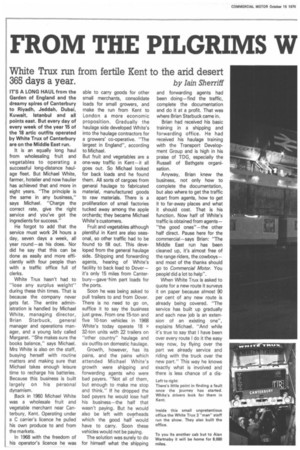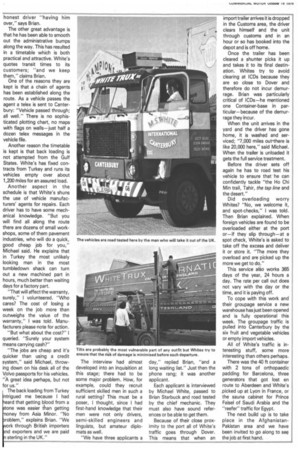FROM THE PILGRIMS W
Page 66

Page 68

If you've noticed an error in this article please click here to report it so we can fix it.
White Trux run from fertile Kent to the arid desert
365 days a year. by lain Sherriff
IT'S A LONG HAUL from the Garden of England and the dreamy spires of Canterbury to Riyadh, Jeddah, Dubai, Kuwait, Istanbul and all points east. But every day of every week of the year 15 of the 18 artic outfits operated by White Trux of Canterbury are on the Middle East run.
It is an equally long haul from wholesaling fruit and vegetables to operating a successful long-distance haulage fleet. But Michael White, farmer, hotelier and now haulier has achieved that and more in eight years. "The principle is the same in any business," says Michael. "Charge the correct rate, give the right service and you've got the ingredients for success."
He forgot to add that the service must work 24 hours a day, seven days a week, all year round—as his does. Nor did he say that this can be done as easily and more efficiently with four people than with a traffic office full of clerks.
White Trux hasn't had to "lose any surplus weight" during these thin times. That is because the company never gets fat. The entire administration is handled by Michael White, managing director, Brian Starbuck, general manager and operations manager, and a young lady called Margaret. "She makes sure the books balance," says Michael. Mrs White is also on the staff, busying herself with routine matters and making sure that Michael takes enough leisure time to recharge his batteries. Because this business is built largely on his personal dynamism.
Back in 1960 Michael White was a wholesale fruit and vegetable merchant near Canterbury, Kent. Operating under a C carrier's licence he pulled his own produce to and from the markets.
In 1968 with the freedom of his operator's licence he was able to carry goods for other small merchants, consolidate loads for small growers, and make the run from Kent to London a more economic proposition. Gradually the haulage side developed White's into the haulage contractors for a growers' co-operative. "The largest in England", according to Michael.
But fruit and vegetables are a one-way traffic in Kent— it all goes out. So Michael looked for back loads and he found them. All sorts of cargoes from general haulage to fabricated material, manufactured goods to raw materials. There is a proliferation of small factories tucked away among the apple orchards; they became Michael White's customers.
Fruit and vegetables although plentiful in Kent are also seasonal, so other traffic had to be found to fill out. This developed from the general haulage side. Shipping and forwarding agents, hearing of White's facility to back load to Dover — it's only 15 miles from Canterbury—gave 'him part loads for the ports.
Soon he was being asked to pull trailers to and from Dover. There is no need to go on, suffice it to say the business just grew. From one 15-ton and five 10-ton vehicles in 1968 White's today operate 18 x 32-ton units with 22 trailers on "other country" haulage and six outfits on domestic haulage.
Growth, however, has its pains, and the pains which attended Michael White's growth were shipping and forwarding agents who were bad payers. "Not all of them, but enough to make me stop and think." If he dropped the bad payers he would lose half his business—the half that wasn't paying. But he would also be left with overheads which the good half would have to carry. Soon these vehicles would not be paying.
The solution was surely to do for himself what the shipping and forwarding agents had been doing—find the traffic, complete the documentation and do it at a profit. That was where Brian Starbuck came in.
Brian had received his basic training in a shipping and forwarding office. He had received his haulage training with the Transport Development Group and is high in his praise of TDG, especially the Russell of Bathgate organisation.
Anyway, Brian knew the business, not only how to complete the documentation, but also where to get the traffic apart from agents, how to get it to far-away places and what it should cost. That is his function. Now half of White's traffic is obtained from agents — "the good ones" —the other half direct. Pause here for the commercial—says Brian: "The Middle East run has been cleaned up, it's almost free of the range riders, the cowboys— and most of the thanks should go to Commercial Motor. You people' did a lot to help".
When White Trux is asked to quote for a new route it surveys it on paper because almost 90 per cent of any new route is already being covered. "The service has built up gradually and each new job is an extension of an existing one", explains Michael. "And while it's true to say that I have been over every route I do it the easy way now, by flying over the part we already service and riding with the truck over the new part." This way he knows exactly what is involved and there is less chance of a dis
Left to right: There's little point in finding a fault once the journey has started. White's drivers look for them in Kent.
Inside this small unpretentious office the White Trux 3 "man" staff run the show. They also built the office.
To you its another cab but to Alan Wartnaby it will be home for 8,000 miles.
honest driver "having him over," says Brian.
The other great advantage is that he has been able to smooth out the administrative bumps along the way. This has resulted in a timetable which is both practical and attractive. White's quotes transit times to its customers; "and we keep them," claims Brian.
One of the reasons they are kept is that a chain of agents has been established along the route. As a vehicle passes the agent a telex is sent to Canterbury: "Vehicle passed through; all well." There is no sophisticated plotting chart, no maps with flags on walls—just half a dozen telex messages in the vehicle file.
Another reason the timetable is kept is that back loading is not attempted from the Gulf States. White's has fixed contracts from Turkey and runs its vehicles empty over about 1,200 nniles for an assured load.
Another aspect in the schedule is that White's shuns the use of vehicle manufacturers' agents for repairs. Each driver has to have some mechanical knowledge. "But you will find all along the route there are dozens of small workshops, some of them pavement industries, who will do a quick, good cheap job for you," Michael said. He explains that in Turkey the most unlikely looking man in the most tumbledown shack can turn out a new machined part in hours, much better than waiting days for a factory part.
"That will affect the warranty, surely," I volunteered. "Who cares? The cost of losing a week on the job more than outweighs the value of the warranty," I was told. Manufacturers please note for action.
"But what about the cost?" I queried. "Surely your system means carrying cash?"
"The jobs are cheap and it's quicker than using a credit system," said Michael, throwing down on his desk all of the Volvo passports for his vehicles. "A great idea perhaps, but not for us."
The back loading from Turkey intrigued me because I had eard that getting blood from a tone was easier than getting oney from Asia Minor. "No roblem," explains Brian. "We ork through British importers nd exporters and we are paid n sterling in the UK." The interview had almost developed into an inquisition at this stage; there had to be some major problem. How, for example, could they recruit sufficient skilled men in such a rural setting? This must be a poser, I thought, since I had first-hand knowledge that their men were not only drivers, semi-skilled engineers and linguists, but amateur diplomats as well.
"We have three applicants a day," replied Brian, "and a long waiting list." Just then the phone rang; it was another applicant.
Each applicant is interviewed by Michael White, passed to Brian Starbuck and road tested by the chief mechanic. They must also have sound references or be able to get them.
Because of their close proximity to the port all of White's traffic goes through Dover. This means that when an import trailer arrives it is dropped in the Customs area, the driver clears himself and the unit through customs and in an hour or so has booked into the depot and is off home.
Once the trailer has been cleared a shunter picks it up and takes it to its final destination. Whites try to avoid clearing at ICDs because they are so close to Dover and therefore do not incur demurrage. Brian was particularly critical of ICDs—he mentioned one Container-base in particular—because of the demurrage they incur.
When the unit arrives in the yard and the driver has gone home, it is washed and serviced; "7,000 miles out-there is like 20,000 here," said Michael. When the trailer is unloaded it gets the full service treatment.
Before the driver sets off again he has to road test his vehicle to ensure that • he can confidently tackle "the Ho Chi Min trail, Tahir, the tap line and the desert."
Did overloading worry Whites? "No, we welcome it, and spot-checks," I was told. Then Brian explained. When foreign vehicles are found to be overloaded either at the port or—if they slip through—at a spot check, White's is asked to take off the excess and deliver it or store it. "The more they overload and are picked up the more we get to do." This service alSo works 365 days of the year, 24 hours a day. The rate per call out does not vary with the day or the time, and it is paying off.
To cope with this work and their groupage service a new warehouse has just been opened and is fully operational this week. The groupage traffic is pulled into Canterbury by the six fruit and vegetable vehicles or empty import vehicles.
All of White's traffic is interesting stuff, some more interesting than others perhaps.
There was the 40 ft container with 2 tons of orthopaedic padding for Barcelona, three generators that got lost en route to Aberdeen and White's .picked up at Lyon in France, or the sauna cabinet for Prince Faisel of Saudi Arabia and the "reefer" traffic for Egypt.
The next build up is to take place in the AfghanistanPakistan area and we have been invited to go along to see the job at first hand.






















































































































